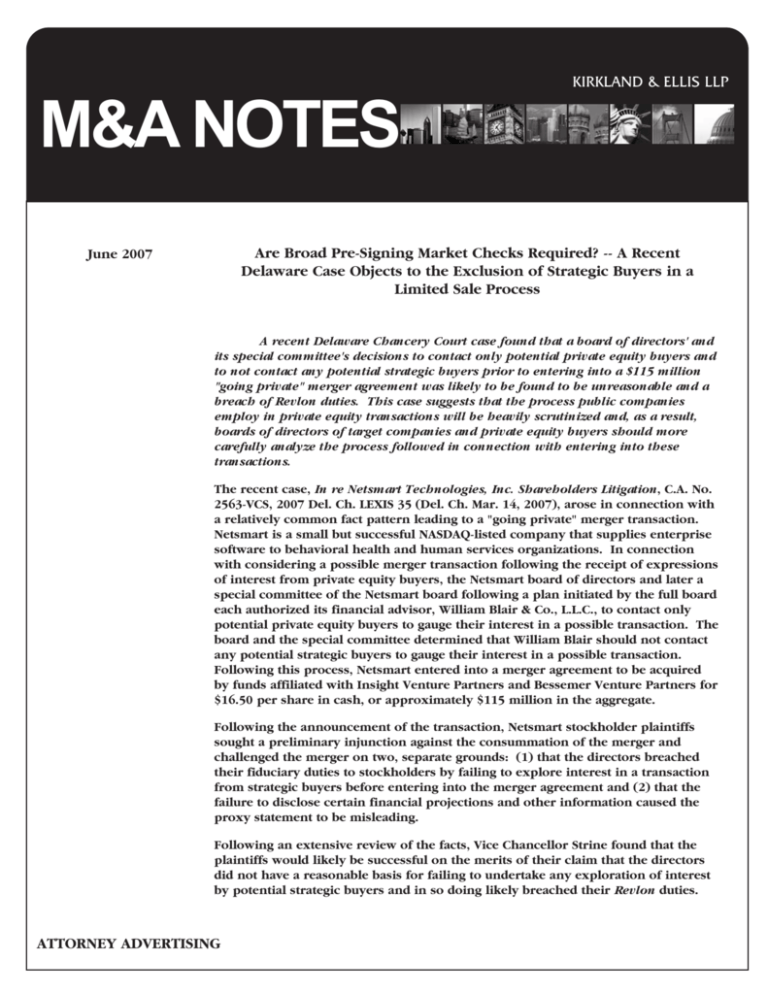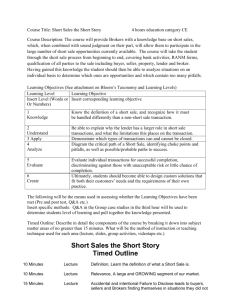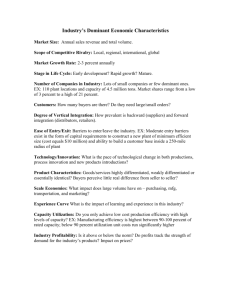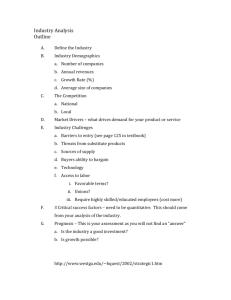
M&A NOTES
KIRKLAND & ELLIS LLP
Are Broad Pre-Signing Market Checks Required? -- A Recent
Delaware Case Objects to the Exclusion of Strategic Buyers in a
Limited Sale Process
June 2007
A recent Delaware Chancery Court case found that a board of directors' and
its special committee's decisions to contact only potential private equity buyers and
to not contact any potential strategic buyers prior to entering into a $115 million
"going private" merger agreement was likely to be found to be unreasonable and a
breach of Revlon duties. This case suggests that the process public companies
employ in private equity transactions will be heavily scrutinized and, as a result,
boards of directors of target companies and private equity buyers should more
carefully analyze the process followed in connection with entering into these
transactions.
The recent case, In re Netsmart Technologies, Inc. Shareholders Litigation, C.A. No.
2563-VCS, 2007 Del. Ch. LEXIS 35 (Del. Ch. Mar. 14, 2007), arose in connection with
a relatively common fact pattern leading to a "going private" merger transaction.
Netsmart is a small but successful NASDAQ-listed company that supplies enterprise
software to behavioral health and human services organizations. In connection
with considering a possible merger transaction following the receipt of expressions
of interest from private equity buyers, the Netsmart board of directors and later a
special committee of the Netsmart board following a plan initiated by the full board
each authorized its financial advisor, William Blair & Co., L.L.C., to contact only
potential private equity buyers to gauge their interest in a possible transaction. The
board and the special committee determined that William Blair should not contact
any potential strategic buyers to gauge their interest in a possible transaction.
Following this process, Netsmart entered into a merger agreement to be acquired
by funds affiliated with Insight Venture Partners and Bessemer Venture Partners for
$16.50 per share in cash, or approximately $115 million in the aggregate.
Following the announcement of the transaction, Netsmart stockholder plaintiffs
sought a preliminary injunction against the consummation of the merger and
challenged the merger on two, separate grounds: (1) that the directors breached
their fiduciary duties to stockholders by failing to explore interest in a transaction
from strategic buyers before entering into the merger agreement and (2) that the
failure to disclose certain financial projections and other information caused the
proxy statement to be misleading.
Following an extensive review of the facts, Vice Chancellor Strine found that the
plaintiffs would likely be successful on the merits of their claim that the directors
did not have a reasonable basis for failing to undertake any exploration of interest
by potential strategic buyers and in so doing likely breached their Revlon duties.
ATTORNEY ADVERTISING
Netsmart's directors had claimed that their decision to
not solicit interest from potential strategic buyers was
reasoned and was based upon several factors
indicating that a transaction with a strategic buyer was
unlikely, including that (i) William Blair had provided
advice to that effect, (ii) management's contacts with
strategic buyers and William Blair's cold calls to
strategic buyers since the late 1990's had not resulted
in any significant interest by strategic buyers in the
acquisition of Netsmart, and (iii) Netsmart's narrow
market segment and small scale were unlikely to be of
interest to strategic buyers. The board also claimed
that it had determined that the risk of contacting
potential strategic buyers was high because Netsmart
directly competes for customers with the most likely
potential strategic buyers and the benefits of such
contacts were not likely to outweigh this business risk.
Finally, while the merger agreement did not permit
Netsmart to solicit interest from competing bidders
after the execution of the agreement, the agreement
provided for (i) a "window shop" period during which
the board could receive offers from interested
competing bidders and (ii) a "fiduciary out"
termination right permitting the board to terminate
the merger agreement with Insight and Bessemer and
accept a superior offer upon the payment of a 3%
break-up fee (as well as other customary deal
protection terms, including the absence of a break-up
fee payment requirement upon a simple rejection of
the transaction by Netsmart's stockholders).
In its analysis, the Court rejected each of the reasons
put forth by the Netsmart directors for their decision
to not solicit interest from potential strategic buyers.
The Court found that the prior contacts with strategic
buyers did not accurately gauge strategic buyers'
current interest in acquiring Netsmart, in part because
of the significant growth and change in the company
in recent years. Specifically, management's
discussions with potential strategic buyers were
sporadic and covered a period of 7 years (averaging
only one per year), the strategic buyers cold called by
William Blair did not understand that Netsmart was "in
play" and none of the contacts with strategic buyers
had occurred since Netsmart had successfully
completed a significant acquisition of its biggest
competitor, which expanded Netsmart's scope and
market position. The Court also found that there were
not unique circumstances that would cause "discreet
and professional overtures" to select strategic buyers
to jeopardize Netsmart's ability to sell its products or
that would create confidentiality issues. Finally, the
Court rejected the board's rationale that in preserving
a post-signing fiduciary out it could effectively
perform a post-signing market check on the terms of
the merger agreement. The Court did not find it
reasonable to conclude that competing bidders with
higher bids would necessarily emerge following the
public announcement of the transaction when the
transaction involved a "micro-cap" company like
Netsmart. As a result, the Court found that a
canvassing of potential buyers before signing a merger
agreement was more important for such companies.
Based on its review of the facts, the Court concluded
that the plaintiffs would likely be successful in
showing that the Netsmart directors acted
unreasonably and breached their Revlon duties by
failing to make a reasonable effort to maximize the
return to Netsmart's stockholders. The Court rejected
all of the plaintiffs' other claims of breach of fiduciary
duties and all but one of their claims of insufficient
disclosure. However, despite its findings on the likely
breach of the directors' Revlon duties, the Court found
that the failure to enjoin the merger would not result
in irreparable injury to the plaintiffs, in part because
no rival bid had surfaced and monetary damages
would suffice (including through the exercise of
appraisal rights, which if successful would increase
the effective cost of the acquisition to the buyer).
Accordingly, the Court refused to enjoin the merger
and permitted the stockholder vote on the merger to
proceed once additional information on the Court's
decision and previously undisclosed projections were
provided to Netsmart's stockholders.
Observations
Need for Carefully Designed and Tailored Sale Process.
One size does not fit all in structuring a sale process.
The Netsmart opinion should not be read as creating a
per se rule that strategic buyers must be sought out
before a target company can enter into a merger
agreement to sell itself. But the opinion should
remind boards of directors and special committees
that they should make careful, reasoned and welldocumented decisions throughout a sale process. In
particular, decisions that seem to favor a going private
transaction, as opposed to staying independent or
selling to a strategic buyer, must be carefully and
thoughtfully evaluated and should not be based simply
on a financial advisor's judgment, regardless of how
correct that judgment may be. In addition, the
opinion suggests that decisions about the sale process
in a smaller transaction may be more heavily
scrutinized than the sale process in a larger
transaction and thus may need to be more carefully
considered.
High Bar to Exclusion of Strategic Buyers on
Competitive Grounds. The Court commented on the
absence of circumstances that would jeopardize
Netsmart's competitive position if strategic buyers
were included in the sale process. Those comments leave
room for the existence of circumstances on which a
board could reasonably determine not to contact strategic
buyers in connection with a sale process because of
competitive reasons or other business sensitivities.
However, the Netsmart opinion suggests that a target
company should reach that decision only on realistic,
concrete and unique bases that should be carefully
articulated and documented in advance of conducting the
sale process.
Disapproval of Sale Processes and Over-Reliance on PostSigning Market Checks. While the specific issues
presented by the Netsmart case will not apply to all cases,
the case seems to reflect a concern by the Delaware
Chancery Court that recent deal practice may stray too
far from the conduct expected of boards of directors with
Revlon duties even if, as in this case, the special
committee seemed to have selected the offer with the
highest and best price. In particular, the case casts
serious doubt on the ability of a board or special
committee to rely on the existence of fiduciary out and
break-up fee provisions in a merger agreement (which
would permit competing bidders to top the value of the
initial agreement) to satisfy its obligation to seek to
obtain the highest and best price for stockholders. This
is particularly true if the board or special committee has
not conducted a reasonable pre-signing market check
(even if not a full-fledged auction) before deciding to
enter into the merger agreement. We note that the
opinion does not address the extent to which boards or
special committees can rely on "go shop" provisions in
merger agreements to assist them in satisfying their
Revlon duties.
Heightened Scrutiny of Private Equity-Sponsored
Transactions. The Netsmart case may also reflect a
concern by the Delaware Chancery Court with the
current prevalence of private equity-sponsored "going
private" transactions, referring to the case as "literally a
microcosm of a current dynamic in the mergers and
acquisitions market." Among other concerns of the Court
about the private equity market noted in the opinion, the
Court seems wary of the preference by management to
sell a target company to a private equity buyer that is
more likely to retain management and give management
a "second bite at the apple" (using the language from a
William Blair slide to the Netsmart board) through equity
participation in the sponsor-backed company. While the
opinion noted that there was not clear evidence that the
Netsmart board's and special committee's decisions to not
solicit interest from potential strategic buyers were based
on a conflict of interest, the opinion suggests that courts
are particularly focused on this risk to a sale process and
may place additional scrutiny on such transactions.
Skepticism about Unsatisfactory Process. Given all of the
other facts and results of the case (including that the
transaction price seemed to be at the highest price
obtainable, management was not found to have "tilted the
competition" based on any conflicts of interest and the
Court did not take issue with the other decisions made by
the board or the special committee), the Court's strong
objection to one judgment by the Netsmart directors is
surprising. It should be noted that the Court took issue
with the manner in which the board and special
committee administered its processes, including practices
for keeping management separate from special
committee deliberations, retention of the special
committee's financial advisors and the negotiation of
management retention arrangements during the
negotiation of the deal terms. In as much as the Court's
skepticism about these processes and the record
influenced its findings, the case is a reminder of the need
to follow best practices during a sale process.
Should you have any questions about the matters addressed in this issue of M&A Notes,
please contact the following Kirkland & Ellis authors or the Kirkland & Ellis partner you normally contact.
Stephen Fraidin
153 E 53rd St
New York, NY 10022
sfraidin@kirkland.com
(212) 446-4840
William Sorabella
153 E 53rd St
New York, NY 10022
wsorabella@kirkland.com
(212) 446-4932
This publication is distributed with the understanding that the author, publisher and distributor are not rendering legal, account, or other
professional advice or opinions on specific facts or matters and, accordingly, assume no liability whatsoever in connection with its use.
Pursuant to applicable rules of professional conduct, this publication may constitute Attorney Advertising.
Copyright © 2007 KIRKLAND & ELLIS LLP. All rights reserved.
www.kirkland.com











